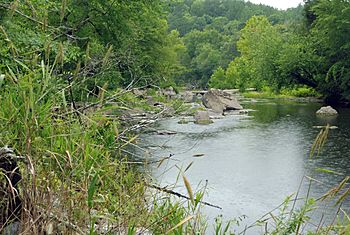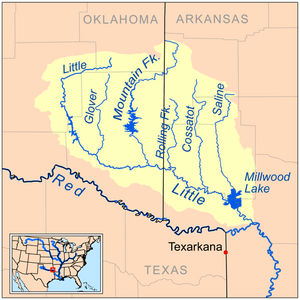Rolling Fork (Arkansas) facts for kids
Quick facts for kids Rolling Fork |
|
|---|---|
 |
|

Map of the Little River watershed showing the Rolling Fork
|
|
| Country | United States |
| State | Arkansas |
| Physical characteristics | |
| Main source | Polk County, Arkansas 34°21′05″N 94°20′53″W / 34.35150°N 94.34799°W |
| River mouth | Confluence with the Red River in Sevier County, Arkansas 33°56′26″N 94°23′48″W / 33.94067°N 94.3968°W |
| Length | 55.4 mi (89.2 km) |
The Rolling Fork is a river in southwest Arkansas. It is about 55 miles (89 kilometers) long. This river is an important part of the Mississippi watershed. It flows into the Little River.
The Rolling Fork is also known for DeQueen Lake. This lake was formed when the DeQueen Dam was built across the river.
Contents
Where is the Rolling Fork River?
The Rolling Fork river is located in the state of Arkansas in the United States. It starts in Polk County, Arkansas. The river then flows south through different towns.
River's Journey: From Source to Mouth
The Rolling Fork river begins its journey in Polk County, Arkansas. This is its source. The river then flows south. It passes through towns like Wickes and Grannis.
About 10 miles (16 kilometers) from where it starts, the Rolling Fork flows into DeQueen Lake. This is a large, man-made lake. The river continues its path after leaving the lake. It flows near Chapel Hill and DeQueen. Finally, the Rolling Fork joins the Little River. This meeting point is called a confluence. It happens in Sevier County, Arkansas.
DeQueen Lake: A Man-Made Wonder
DeQueen Lake is a big reservoir. It was created by building the DeQueen Dam on the Rolling Fork river. Reservoirs are like large, artificial lakes. They are often used to store water. They can also help control floods.
This lake is a popular spot for outdoor activities. People enjoy fishing and boating here. It is an important feature along the river's course.
Other Rivers Nearby
The Rolling Fork is one of several rivers in this area. It runs alongside other rivers that also flow into the Little River. These include the Cossatot River, the Saline River, the Mountain Fork, and the Glover River. All these rivers are part of the larger Mississippi watershed. This means their waters eventually flow into the mighty Mississippi River.

